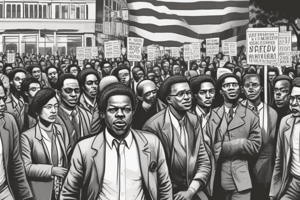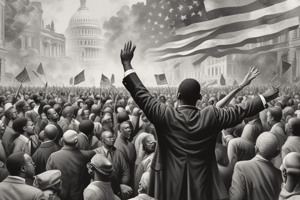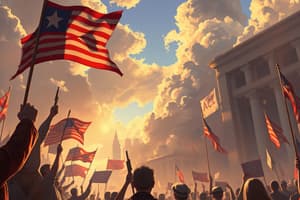Podcast
Questions and Answers
What event marked the beginning of the modern LGBTQ+ rights movement?
What event marked the beginning of the modern LGBTQ+ rights movement?
- The passage of the Civil Rights Act of 1964
- The formation of the Gay Liberation Front
- The Women's Suffrage Movement
- The Stonewall Riots (correct)
What was the primary goal of the African American Civil Rights movement?
What was the primary goal of the African American Civil Rights movement?
- To promote LGBTQ+ rights
- To end racial segregation and discrimination against African Americans (correct)
- To establish the Equal Employment Opportunity Commission (EEOC)
- To secure women's right to vote
What did the Civil Rights Act of 1964 prohibit?
What did the Civil Rights Act of 1964 prohibit?
- LGBTQ+ individuals from holding public office
- Women from voting
- Segregation in public accommodations and employment discrimination (correct)
- African Americans from attending public schools
Who led the Montgomery Bus Boycott in 1955-1956?
Who led the Montgomery Bus Boycott in 1955-1956?
What year did the Women's Suffrage movement achieve its goal?
What year did the Women's Suffrage movement achieve its goal?
What was created by the Civil Rights Act of 1964 to enforce the law?
What was created by the Civil Rights Act of 1964 to enforce the law?
What event is considered the starting point of the modern LGBTQ+ rights movement?
What event is considered the starting point of the modern LGBTQ+ rights movement?
What landmark legislation was passed in 1964 to outlaw discrimination and protect voting rights?
What landmark legislation was passed in 1964 to outlaw discrimination and protect voting rights?
Which of the following figures was not a key figure in the African American Civil Rights movement?
Which of the following figures was not a key figure in the African American Civil Rights movement?
In what year were the first LGBTQ+ pride marches held in New York City and other cities?
In what year were the first LGBTQ+ pride marches held in New York City and other cities?
What was the outcome of the US Supreme Court ruling regarding segregation on public buses?
What was the outcome of the US Supreme Court ruling regarding segregation on public buses?
Which of the following is not a milestone in the LGBTQ+ rights movement?
Which of the following is not a milestone in the LGBTQ+ rights movement?
Flashcards are hidden until you start studying
Study Notes
US History and Civil Rights Movement
Stonewall Riots (1969)
- A series of spontaneous demonstrations by LGBTQ+ individuals in response to a police raid on the Stonewall Inn, a gay bar in New York City
- Marked the beginning of the modern LGBTQ+ rights movement
- Led to the formation of the Gay Liberation Front and other LGBTQ+ organizations
- Considered a turning point in the fight for LGBTQ+ rights
Civil Rights Act of 1964
- Landmark legislation that outlawed discrimination based on race, color, religion, sex, or national origin
- Prohibited segregation in public accommodations and employment discrimination
- Created the Equal Employment Opportunity Commission (EEOC) to enforce the law
- Signed into law by President Lyndon B. Johnson on July 2, 1964
Women's Suffrage
- The right of women to vote was granted with the passage of the 19th Amendment to the US Constitution in 1920
- The movement for women's suffrage was led by figures such as Elizabeth Cady Stanton and Susan B. Anthony
- The 19th Amendment states: "The right of citizens of the United States to vote shall not be denied or abridged by the United States or by any State on account of sex"
African American Civil Rights
- The movement sought to end racial segregation and discrimination against African Americans
- Key events include:
- Montgomery Bus Boycott (1955-1956): Led by Dr. Martin Luther King Jr., the boycott ended with the US Supreme Court ruling that segregation on public buses was unconstitutional
- March on Washington (1963): Dr. King delivered his iconic "I Have a Dream" speech, calling for civil and economic rights for African Americans
- Civil Rights Act of 1964 and Voting Rights Act of 1965: Landmark legislation that outlawed discrimination and protected voting rights
- Key figures include Dr. Martin Luther King Jr., Rosa Parks, and Malcolm X
LGBTQ+ Activism
- The modern LGBTQ+ rights movement began with the Stonewall Riots in 1969
- Key events and milestones include:
- The American Psychiatric Association removes homosexuality from its list of mental disorders (1973)
- The first LGBTQ+ pride marches are held in New York City and other cities (1970)
- The "Don't Ask, Don't Tell" policy is repealed, allowing LGBTQ+ individuals to serve openly in the military (2010)
- Same-sex marriage is legalized in the United States (2015)
- Key figures include Marsha P. Johnson, Sylvia Rivera, and Harvey Milk
Studying That Suits You
Use AI to generate personalized quizzes and flashcards to suit your learning preferences.



